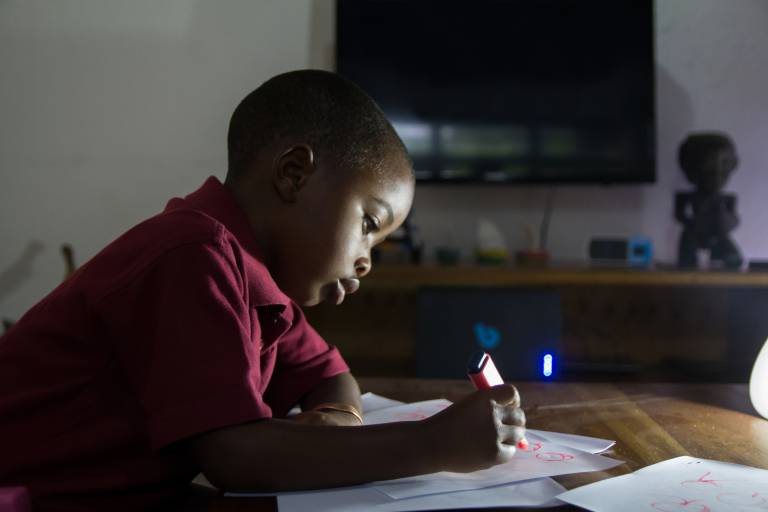Dr. Priti Parikh has been awarded a five-year fellowship, ‘Smart Solar Solutions for All (S34ALL)’, with the Royal Academy of Engineering, co-funded by industry partner BBOXX.

Aims
- To develop energy prediction models for low to middle income countries. This in turn will create an evidence base, ensuring sustainable and affordable energy access to more people, and hopefully alleviating poverty.
Why undertake research in this area?
At a level of circa 42% in 2016 (see Quartz Africa's article), the household electrification rate in sub-Saharan Africa is the lowest in the world. As energy access has a fundamental role to play in poverty alleviation, S34ALL’s aim to generate an evidence base, ensuring sustainable and affordable energy access, is vitally important. Good energy access also enables good access to education, markets and information, plus also enhances mobility through improved transportation systems and food security.
This fellowship is designed to achieve such results by taking into account erratic consumption patterns combining quantitative models - for example, artificial neural networks - with consumer behaviour studies.
COVID: COVID threatens to reverse gains made to address SDG7 by throwing more households into energy poverty. There is a need to boost and support the off-grid sector which electrifies marginalised communities. See our recently released report in collaboration with Bboxx on COVID and implications for household economics.
Off-Grid Energy and Economic Prosperity report.
Dr. Parikh has been awarded a five-year fellowship, ‘Smart Solar Solutions for All (S34ALL)’, with the Royal Academy of Engineering, co-funded by industry partner BBOXX. S34ALL will develop energy prediction models for low to middle income countries - such as those in sub-Saharan Africa - where current modelling work is sparse. S34ALL partners include the University of Rwanda and the Low Carbon Energy for Development Network (LCEDN), who will provide support to foster collaborations both in the UK and sub-Saharan Africa.
Links
Please note, links on this webpage may lead to external websites.
- Royal Academy of Engineering website
- BBOXX website
- University of Rwanda website
- Low Carbon Energy for Development Network website
- Smart Solar Solutions for All Fellowship page
Outputs
Solar home system: A review of literature on solar home system highlighted gaps in interdisciplinary research, paucity of data on energy consumption and the need to better understand future needs and aspirations of consumers. See our review of the literature:
https://www.sciencedirect.com/science/article/pii/S0973082620302805
Consumer behaviour: The team has explored consumer behaviour, energy aspiration and needs for solar home system users in remote communities. They found that energy consumers do not transition to clean energy sources in a linear fashion. They practice fuel stacking as consumers in resource challenged settings are vulnerable to shocks and stresses.
https://www.sciencedirect.com/science/article/pii/S2214629618304961
https://onlinelibrary.wiley.com/doi/full/10.1002/wene.310
Energy modelling: Using real time data on energy consumption and payment patterns the team are developing machine learning models to predict current and future electricity consumption trends. Paucity of data had led to gaps in understanding consumer journey, motivations for upgrading solar home systems and understanding future market trends. See our work on customer journey for solar home system users
https://www.mdpi.com/1996-1073/14/2/330
Clean cooking: Clean cooking fuel needs to be part of the transition pathway to clean energy with wider benefits such as health. Women and children are most affected by indoor air pollution. Similarly to electricity we found that households practice cooking fuel stacking so they use both charcoal and lpg. See our report below funded by MECS which provides recommendations on how to encourage consumers to switch from polluting to clean fuels.
A new policy brief highlights how the reintroduction of 16% Value Added Tax (VAT) on liquefied petroleum gas (LPG) in Kenya is reversing progress made in clean cooking adoption.
Research carried out by the University of Liverpool, University College London and Moi University in collaboration with the Kenyan Ministries of Health and Energy found that half of urban households cooking with LPG in Western Kenya decreased their consumption following the VAT reintroduction. See key recommendations below:
 Close
Close

